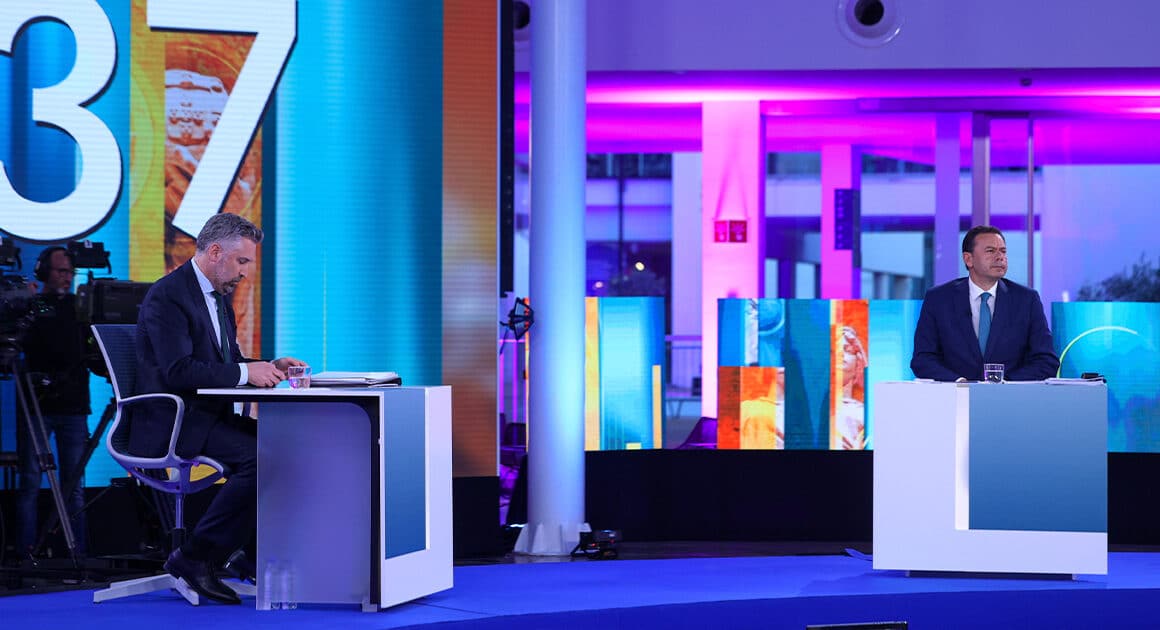Electoral campaign begins in earnest on Sunday
With the latest ‘race to the polls’ (the third in three years) officially kicking off on Sunday, neither the prime minister nor his rival for the post, PS secretary general Pedro Nuno Santos, emerged from last night’s head-to-head victorious.
In other words, there is still everything to play for in an election that threatens to return very much the same as the last: a government with no significant majority.
The immediate takeaway from last night’s ‘confrontation’ between the two men focused on running the country after May 18 is that it did not touch on immigration, in spite of the fact that demonstrations have been planned today in Lisbon (Martim Moniz) and São Teotónio, Odemira (the Alentejo town radically transformed by immigration from the Asian sub-continent), precisely to try and place immigration firmly within the electoral debate.
What started the 70-minutes broadcast live on all three general channels (RTP, SIC and TVI) was Monday’s blackout and how the government responded to it. Pundits giving their impressions afterwards agreed that the Socialist leader, in spite of being highly critical of what he described as the government’s lack of timely communication to the country, did not actually give a very clear picture of what he would have done differently (other than communicate to the country at an earlier juncture). The prime minister continued to maintain that his government rose to the challenge of responding to the nationwide power outage, and that no-one had died (this in reference to the five people who lost their lives in Spain while it was suffering from the same lack of electricity).
Topics then moved into the territory of the economy/ pensions/ housing – and of course Spinumviva, the PM’s ‘family firm’ at the root of the political crisis that brought the government down. Pedro Nuno Santos continued to accuse his adversary of “receiving money from some of the companies” using Spinumviva’s services while he was prime minister, and Mr Montenegro continued to deny this.
As SIC’s political commentator Bernão Ferrão commented afterwards, “I think Pedro Nuno Santos spent too long on two issues: the first was the blackout, in which it wasn’t clear what he would have done differently, and the second was Spinumviva, where it seemed that everything he brought up was already well-known” – and, if polls are to be believed, not particularly relevant in the eyes of the country’s voters.
Much of the confrontation centred on the two men’s clear antipathy towards each other, and different attitudes on how to run a country: Pedro Nuno Santos disagreeing with the AD coalition’s ideas of public private partnerships with the health service, and with more or less everything else – other than the fact that it is vital that the construction of homes has to be fast-tracked.
When it came to ‘voting on who won’ when it came to answers, SIC’s panel of political watchers generally favoured Luís Montenegro over Pedro Nuno Santos, but not by much of a margin. Tabloid Correio da Manhã, however, suggests today that “Pedro Nuno Santos was better than Luís Montenegro in various moments”.
Sunday eveningwill see the last of these televised confrontations, and on this last occasion all the leaders of the political parties with MPs in the current parliament will be facing each other in a similar format, to be transmitted live from 9.30pm.
The following day, the same leaders will have a debate on live radio, to be transmitted by Renascença, Antena 1, TSF and Observador.
After that, it is ‘back to the streets’, as political bandwagons will be travelling around the country trying to ensure that Portugal votes, and votes convincingly, on Sunday May 18. ND




















